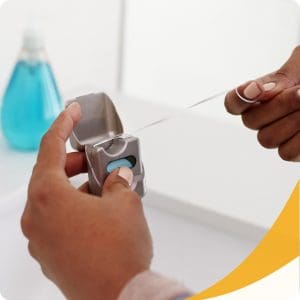Daily dental flossing can work wonders for your teeth, mouth, and gums. You can avoid cavities, gum disease, bacterial infections, and other problems with the proper flossing practices. However, for some people, flossing presents some challenges. Fortunately, you can overcome those obstacles and start flossing your way to good oral health with these tips.
Make It a Routine
Do you frequently forget to floss? If so, you could set up daily phone reminders until it becomes a habit.
Maybe your daily schedule is packed, and flossing feels like an extra burden. Well, you could always floss while doing something else: reading, playing a podcast, listening to music, watching sports, or even showering. Also, when you begin to floss regularly, your gums might bleed. Don’t be alarmed. After several days, the bleeding should stop.
Use Lots of Floss
Since floss is cheap and plentiful, you needn’t be shy about using long strands of it. You’ll probably need about 18 to 24 inches each time. That way, you won’t clean more than one gap with the same segment of floss, which can be unsanitary.
You could wrap your floss around your middle fingers a few times. Then, with your index fingers and thumbs, stretch out a couple of inches at a time.
Be Firm Yet Gentle
If flossing hurts, you might be pressing too hard. For the best outcomes, use slow, even, and gentle motions. Indeed, hard flossing provides no extra benefits, and it can lead to problems. Over time, it can harm gums and weaken enamel, for instance.
At the same time, make sure your floss is taut. Plus, it’s a good idea to floss each gap twice and at two different angles. That way, you’ll make full contact with both sides of every tooth. Also, when you push your floss into a gap, don’t press straight down into your gum. Instead, glide the floss to the side, following the gum’s curve.
Of course, daily flossing is only one of the three pillars of dental hygiene. It’s just as important to brush after every meal — or at least twice a day. On top of that, a regular dental checkup is a must. There’s no substitute for a professional teeth cleaning appointment.
Additionally, if you have any ongoing problems with flossing, tell your dentist about it. Maybe you just have to adjust your technique. Or you might need a different type of floss: a thinner floss or waxed floss, for example. At Smile Every Day Dentistry and Orthodontics, your Tamarac dentist or Plantation dentist would be happy to help you get the most out of your daily flossing. In time, your teeth and mouth will thank you for it.
December 30, 2021

 Adult
Adult




